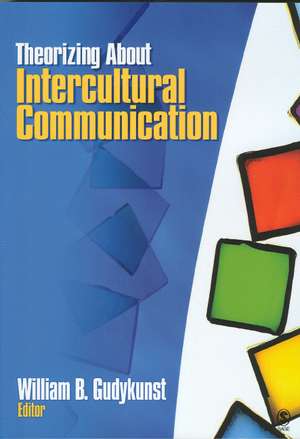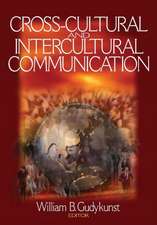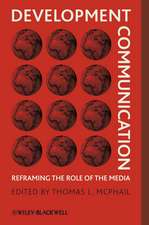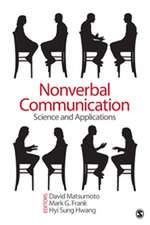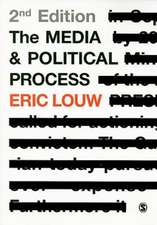Theorizing About Intercultural Communication
Editat de William B. Gudykunsten Limba Engleză Paperback – 21 noi 2004
Key Features
First student text on intercultural communication theories with consistent chapter organization, headings, and pedagogy to aid comprehension and allow for theories to be easily compared and contrasted
Intercultural communication theories are discussed by those who developed them to provide a firsthand look at how these theories originated
An introductory chapter and part overviews highlight the importance of studying and using intercultural communication theories
Each theory's testing and application is emphasized to demonstrate how the theory can be implemented
Several new hypotheses on topics such as co-cultural and dialectical concepts are examined, in addition to modifications of long-standing theories, making this the most up-to-date text on intercultural communication theories
Theorizing About Intercultural Communication is an excellent text for advanced undergraduate and graduate courses on Intercultural Communication, Communication Theory, and Cultural Studies.
| Toate formatele și edițiile | Preț | Express |
|---|---|---|
| Paperback (1) | 1106.45 lei 6-8 săpt. | |
| SAGE Publications – 21 noi 2004 | 1106.45 lei 6-8 săpt. | |
| Hardback (1) | 1346.10 lei 6-8 săpt. | |
| SAGE Publications – 21 noi 2004 | 1346.10 lei 6-8 săpt. |
Preț: 1106.45 lei
Preț vechi: 1349.32 lei
-18% Nou
Puncte Express: 1660
Preț estimativ în valută:
211.74€ • 219.72$ • 176.98£
211.74€ • 219.72$ • 176.98£
Carte tipărită la comandă
Livrare economică 15-29 martie
Preluare comenzi: 021 569.72.76
Specificații
ISBN-13: 9780761927495
ISBN-10: 0761927492
Pagini: 488
Ilustrații: 1, black & white illustrations
Dimensiuni: 178 x 254 x 26 mm
Greutate: 0.84 kg
Ediția:New.
Editura: SAGE Publications
Colecția Sage Publications, Inc
Locul publicării:Thousand Oaks, United States
ISBN-10: 0761927492
Pagini: 488
Ilustrații: 1, black & white illustrations
Dimensiuni: 178 x 254 x 26 mm
Greutate: 0.84 kg
Ediția:New.
Editura: SAGE Publications
Colecția Sage Publications, Inc
Locul publicării:Thousand Oaks, United States
Recenzii
"Each chapter takes on the issue at hand with a considerable degree of rigor that incorporates extensive literature review, theoretical backgrounds, and detailed explanations of the development of each theoretical perspective."
—International Criminal Justice Review
—International Criminal Justice Review
Cuprins
Preface - William B. Gudykunst
Part I: Introduction
Chapter 1: Theorizing about Intercultural Communication: An Introduction - William B. Gudykunst, Carmen M. Lee, Tsukasa Nishida, and Naoto Ogawa
Part II: Theories of Communication Incorporating Culture
Chapter 2: The Coordinated Management of Meaning (CMM) - W. Barnett Pearce
Chapter 3: Speech Codes Theory: Restatement, Revisions, and Response to Criticisms - Gerry Philipsen, Lisa Coutu, and Patricia Covarrubias
Part III: Theories Focusing on Cross-Cultural Variability in Communication
Chapter 4: The Matrix of Face: An Updated Face-Negotiation Theory - Stella Ting-Toomey
Chapter 5: Culture-Based Conversational Constraints Theory: Individual- and Culture-Level Analyses - Min-Sun Kim
Part IV: Theories Focusing on Adaptations in Interactions
Chapter 6: Communication Accomodation Theory: A Look Back and a Look Ahead - Cindy Gallois, Tanya Ogay, and Howard Giles
Chapter 7: Cross-Cultural and Intercultural Applications of Expectations Violations Theory and Interaction Adaptation Theory - Judee K. Burgoon and Amy Ebesu Hubbard
Chapter 8: From the Margins to the Center: Utilizing Co-Cultural Theory in Diverse Contexts - Mark P. Orbe and Regina E. Spellers
Part V: Theories Focusing on Identity
Chapter 9: Identity Management Theory: Facework in Intercultural Relationships - Tadasu Todd Imahori and William R. Cupach
Chapter 10: Identity Negotiation Perspective: A Theoretical Framework - Stella Ting-Toomey
Chapter 11: Theorizing Cultural Identifications: Critical Updates and Continuing Evolution - Mary Jane Collier
Chapter 12: A Communication Theory of Identity: Development, Theoretical Perspective, and Future Directions - Michael L. Hecht, Jennifer R. Warren, Eura Jung, and Janice L. Krieger
Part VI: Theories Focusing on Effective Communication & Decisions
Chapter 13: An Anxiety/Uncertainty Management (AUM) Theory of Effective Communication - William B. Gudykunst
Chapter 14: Association and Dissociation: A Contextual Theory of Interethnic Communication - Young Yun Kim
Chapter 15: Effective Intercultural Work Group Communication Theory - John Oetzel
Part VII: Theories Focusing on Adjustment and Acculturation
Chapter 16: Adapting to a New Culture: An Integrative Communication Theory - Young Yun Kim
Chapter 17: Cultural Schema Theory - Hiroko Nishida
Chapter 18: An Anxiety/Uncertainty Management (AUM) Theory of Sojourner Adjustment - William B. Gudykunst
Part I: Introduction
Chapter 1: Theorizing about Intercultural Communication: An Introduction - William B. Gudykunst, Carmen M. Lee, Tsukasa Nishida, and Naoto Ogawa
Part II: Theories of Communication Incorporating Culture
Chapter 2: The Coordinated Management of Meaning (CMM) - W. Barnett Pearce
Chapter 3: Speech Codes Theory: Restatement, Revisions, and Response to Criticisms - Gerry Philipsen, Lisa Coutu, and Patricia Covarrubias
Part III: Theories Focusing on Cross-Cultural Variability in Communication
Chapter 4: The Matrix of Face: An Updated Face-Negotiation Theory - Stella Ting-Toomey
Chapter 5: Culture-Based Conversational Constraints Theory: Individual- and Culture-Level Analyses - Min-Sun Kim
Part IV: Theories Focusing on Adaptations in Interactions
Chapter 6: Communication Accomodation Theory: A Look Back and a Look Ahead - Cindy Gallois, Tanya Ogay, and Howard Giles
Chapter 7: Cross-Cultural and Intercultural Applications of Expectations Violations Theory and Interaction Adaptation Theory - Judee K. Burgoon and Amy Ebesu Hubbard
Chapter 8: From the Margins to the Center: Utilizing Co-Cultural Theory in Diverse Contexts - Mark P. Orbe and Regina E. Spellers
Part V: Theories Focusing on Identity
Chapter 9: Identity Management Theory: Facework in Intercultural Relationships - Tadasu Todd Imahori and William R. Cupach
Chapter 10: Identity Negotiation Perspective: A Theoretical Framework - Stella Ting-Toomey
Chapter 11: Theorizing Cultural Identifications: Critical Updates and Continuing Evolution - Mary Jane Collier
Chapter 12: A Communication Theory of Identity: Development, Theoretical Perspective, and Future Directions - Michael L. Hecht, Jennifer R. Warren, Eura Jung, and Janice L. Krieger
Part VI: Theories Focusing on Effective Communication & Decisions
Chapter 13: An Anxiety/Uncertainty Management (AUM) Theory of Effective Communication - William B. Gudykunst
Chapter 14: Association and Dissociation: A Contextual Theory of Interethnic Communication - Young Yun Kim
Chapter 15: Effective Intercultural Work Group Communication Theory - John Oetzel
Part VII: Theories Focusing on Adjustment and Acculturation
Chapter 16: Adapting to a New Culture: An Integrative Communication Theory - Young Yun Kim
Chapter 17: Cultural Schema Theory - Hiroko Nishida
Chapter 18: An Anxiety/Uncertainty Management (AUM) Theory of Sojourner Adjustment - William B. Gudykunst
Descriere
In Theorizing About Intercultural Communication, editor William B. Gudykunst brings together key theories that have shaped and influenced human intercultural communication. This text provides an excellent overview of the major theories currently in use and examines how these theories will also support the foundation for future research in this area. Contributors to this text include individuals who actually developed the theories covered in the book. Each contributor highlights the evolution, development, and application of the theory to provide a thorough and contemporary view of the field.
